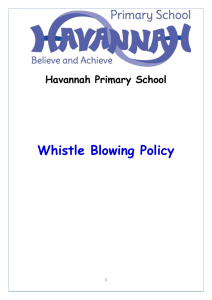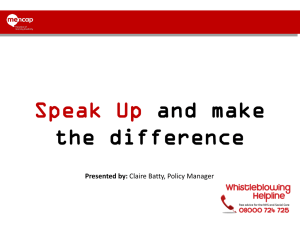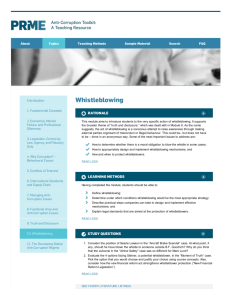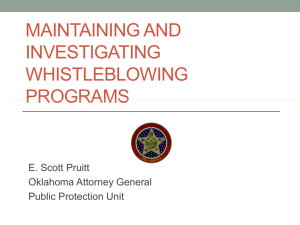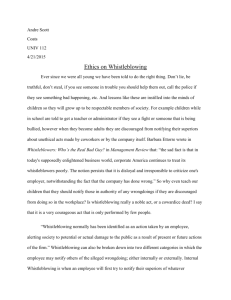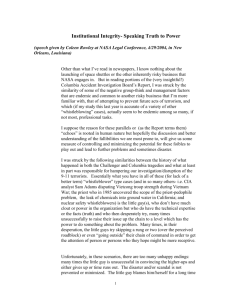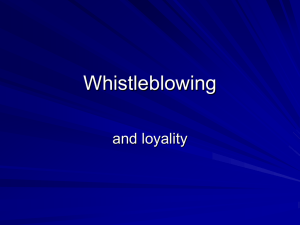Pages: 80-90 (Download PDF) - European/American Journals
advertisement
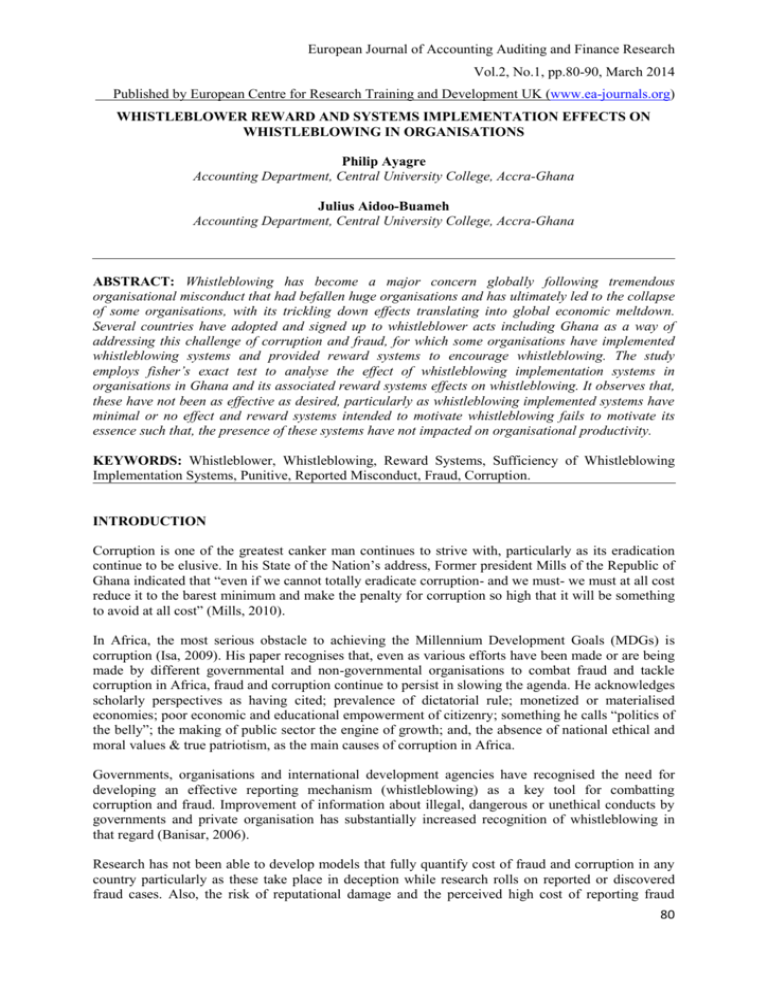
European Journal of Accounting Auditing and Finance Research Vol.2, No.1, pp.80-90, March 2014 Published by European Centre for Research Training and Development UK (www.ea-journals.org) WHISTLEBLOWER REWARD AND SYSTEMS IMPLEMENTATION EFFECTS ON WHISTLEBLOWING IN ORGANISATIONS Philip Ayagre Accounting Department, Central University College, Accra-Ghana Julius Aidoo-Buameh Accounting Department, Central University College, Accra-Ghana ABSTRACT: Whistleblowing has become a major concern globally following tremendous organisational misconduct that had befallen huge organisations and has ultimately led to the collapse of some organisations, with its trickling down effects translating into global economic meltdown. Several countries have adopted and signed up to whistleblower acts including Ghana as a way of addressing this challenge of corruption and fraud, for which some organisations have implemented whistleblowing systems and provided reward systems to encourage whistleblowing. The study employs fisher’s exact test to analyse the effect of whistleblowing implementation systems in organisations in Ghana and its associated reward systems effects on whistleblowing. It observes that, these have not been as effective as desired, particularly as whistleblowing implemented systems have minimal or no effect and reward systems intended to motivate whistleblowing fails to motivate its essence such that, the presence of these systems have not impacted on organisational productivity. KEYWORDS: Whistleblower, Whistleblowing, Reward Systems, Sufficiency of Whistleblowing Implementation Systems, Punitive, Reported Misconduct, Fraud, Corruption. INTRODUCTION Corruption is one of the greatest canker man continues to strive with, particularly as its eradication continue to be elusive. In his State of the Nation’s address, Former president Mills of the Republic of Ghana indicated that “even if we cannot totally eradicate corruption- and we must- we must at all cost reduce it to the barest minimum and make the penalty for corruption so high that it will be something to avoid at all cost” (Mills, 2010). In Africa, the most serious obstacle to achieving the Millennium Development Goals (MDGs) is corruption (Isa, 2009). His paper recognises that, even as various efforts have been made or are being made by different governmental and non-governmental organisations to combat fraud and tackle corruption in Africa, fraud and corruption continue to persist in slowing the agenda. He acknowledges scholarly perspectives as having cited; prevalence of dictatorial rule; monetized or materialised economies; poor economic and educational empowerment of citizenry; something he calls “politics of the belly”; the making of public sector the engine of growth; and, the absence of national ethical and moral values & true patriotism, as the main causes of corruption in Africa. Governments, organisations and international development agencies have recognised the need for developing an effective reporting mechanism (whistleblowing) as a key tool for combatting corruption and fraud. Improvement of information about illegal, dangerous or unethical conducts by governments and private organisation has substantially increased recognition of whistleblowing in that regard (Banisar, 2006). Research has not been able to develop models that fully quantify cost of fraud and corruption in any country particularly as these take place in deception while research rolls on reported or discovered fraud cases. Also, the risk of reputational damage and the perceived high cost of reporting fraud 80 European Journal of Accounting Auditing and Finance Research Vol.2, No.1, pp.80-90, March 2014 Published by European Centre for Research Training and Development UK (www.ea-journals.org) (including competitor advantage) lead organisations to prefer suffering losses in silence than going public by way of reporting to authorities or the media. The challenge of quantifying cost of fraud is made murkier as no one is able to determine the cost of trickling effects of corruption such as persons who die on roads or at hospitals due to diversion of resources in corruption. In spite of difficulties of putting figures to fraud and corruption, statistical figures help provide a bird’s eye view of the magnitude of the problem in domestic or global economy. Indices have been developed for assessing the extent of fraud and corruption globally. Notable among them are Transparency International’s Corruption Perception Index (CPI), KPMG’s and PWC’s Fraud Surveys, and Ibrahim’s Index. Results of these surveys are often met with fierce reaction by ruling governments giving one reason or the other why such results should not be trusted. This is indicative that, all and sundry recognise the far reaching political, economic, and social consequences of corruption or being tagged corrupt. Attempts at some indices provide that, 43% of International Businesses were of fraud globally during the previous two years as at 2007, 85% of companies suffered from at least one fraud in the past three years, with high profiled companies such as Enron, Worldcom and Barings suffering losses to the tunes of USD 1.5billion, USD 3.8 billion, and USD 1.4 billion respectively (Helenne, 2008). According to Celarier 1996 as cited by Okori, 2010, Transparency International (TI) indicates that, as much as USD 30billion in aid to Africa ended up in unapproved foreign bank accounts, an amount colossal enough to make up twice the GDPs of Ghana, Kenya and Uganda combined (Okori, 2010). In an effort to ascertain effects of efforts being made to combatting this menace, the study seeks to ascertain how far whistleblower acts and whistleblower systems in organisations are impacting on whistleblowing. In this pursuit, awareness of the whistle blower Act and the presence of whistleblowing reporting systems in organisations formed the premise upon which the study proceeds on the following null hypotheses: H0B1: Deterrence sufficiency of organisational whistleblower implementation systems has no effect on reported wrongdoings after promulgation of the act H0B2: Organisational reward systems for disclosing misconducts have no effect on increase in reported wrongdoings since promulgation of the act. H0B4: Reported wrongdoings after promulgation of the act have not resulted in changes in organisations performance outcome H0C3: The deterrence sufficiency of the organisations’ whistleblowing implementation systems has not resulted in increased organisational performance outcome H0D2: Existence of Reward systems for disclosing misconduct has no effect on performance outcomes in organisations. The significance of the study is to inform the effectiveness of the whistblower act and organisational whistleblowing systems in place on whistleblowing and to draw attention to necessary factors that need improvement. LITERATURE REVIEW Theoretical Literature Davis, (1996) provides three standard theories that justify whistleblowing (Davis, 1996). The first being an act permitted by morality (in the weak sense), thus, whistleblowing is morally right, though the alternatives are morally right too. The second being, doing the whistleblowing not only because it is moral, but that, doing anything else is morally wrong (i.e. the strong sense). The third paradox which relates to the second indicates that, insofar as whistleblowers are understood as people out to prevent harm, not themselves just enough to prevent moral wrong, their chances of success are not good. 81 European Journal of Accounting Auditing and Finance Research Vol.2, No.1, pp.80-90, March 2014 Published by European Centre for Research Training and Development UK (www.ea-journals.org) Goal theory proposes that human beings are more motivated to act when there is a reward at the end of the performance of a task or behaviour (Life Success Secrets.com, 2013).Herzberg asserts that, the best way to motivate employees is to enrich their jobs (Herzberg, 1968). Herzberg et al (1959) identify first motivators to include recognition, achievement, responsibility, and work itself; and the second motivators to be salary, interpersonal relations with supervisors, interpersonal relations with peers, working conditions, and job security (Herzberg, Maunser, & Snyderman, 1959). These together had stimulated building up of reward systems into organisational whistleblower systems to motivate whistleblowing in organisations. Whistleblowing: Ralph Nader defined whistleblowing as “an act of a man or woman who, believing that the public interest overrides the interest of the organisation he serves, blows the whistle that the organisation is involved in corrupt, illegal, fraudulent or harmful activity” (Nader, 2013). Earlier studies have related whistleblowing with ethics, and in some cases linked to virtue ethics as recognises it as done based on strong foundation in virtue ethics (Faunce, 2004). Attafuah, 2010 defines it as “the act of revealing or disclosing information about another person’s impropriety to one or more persons or institutions specified by the whistleblowers Act in order to fight corruption, ensure the rule of law, promote public ethics, and preserve the public interest” (Attafuah, 2010). UK’s Public Concern At Work, a whistleblowing centre defines whistleblowing as “raising concerns about misconduct within an organisation or within an independent structure associated with it.” Whistleblowing can be traced back to 1963 in the USA when Otto Otopeka of the State Department, revealed classified documents on security risks to the chief counsel for the Senate Subcommittee on Internal Security, which ultimately cost him his job (Petersen & Farrell, 1986). Sherron Watkins, another high profiled whistleblower who became a celebrity in 2002 after a congressional committee leaked memos she had written to Kenneth Lay, the founder of Enron Corporation about the organisation’s impending implosion, before it filed the largest corporate bankruptcy ever in history at the time. Banisar (2006)’s observation that there has been substantial increase in recognition of whistleblowing as a corruption fighting tool by improving disclosure of information about illegal, dangerous or unethical activities by government and private entities (Banisar, 2006). His observation concurs with the recent spate of responses of countries to passing acts and laws to protect whistleblowers by several countries including US, England, Canada, Kenya and more recently Ghana. Whistleblowing in Context of Fraud Detection: PWC’s, 2007 study on Economic Crime evaluated a range of fraud detection methods and the extent to which these have helped in detecting fraud. These methods included external audit reviews, corporate security, law enforcement, by accident, risk management, internal audit reviews, and whistleblowing in ascending order of effectiveness. Of these, the combination of External Tip-off, Internal tip-off and whistleblowing hotline combined, constituting whistleblowing, make the highest effective tool as indicated by respondents, making whistleblowing the most effective tool for fraud detection (Wells, 2007; PricewaterhouseCoopers, 2007). Further to its effectiveness to fraud detection, whistleblowing has been identified as a strong fraud prevention factor, as potential perpetrators are less likely to indulge if the prospect of being reported was high (Hook, 1994). Whistleblowing Deterrence: Cultural influence, fear of victimisation (including loss of jobs), and lack of trust in management have been cited as deterrence to whistleblowing. In a study on Cultural perception of whistleblowing conducted by Hartman, he cites Ernst & Young’s, 2008 regional analysis observation of the dichotomy in confidence of Northern American executives’ as against managers in Central Europe, the Far East and Japan’s disbelief in effectiveness of same tool for minimising corruption (Hartman, 2009). In Ghana, a Global Integrity Report (2008) indicates that, civil servants do not blow the whistle 82 European Journal of Accounting Auditing and Finance Research Vol.2, No.1, pp.80-90, March 2014 Published by European Centre for Research Training and Development UK (www.ea-journals.org) due to lack of trust of police keeping their identity confidential (Global Integrity, 2013). Another factor mentioned was the lack of confidence in government’s commitment to declarations on corruption, and did not believe that these were backed by political will. Another deterrence to whistleblowing was the perception that most of the corrupt reportable offences are committed by management of which employees are not convinced of same taking action against potential offenders as they will be referees of their own game (Yin, 2013). In the incidents involving accidents of ferries, trains, and oil rigs that triggered the public interest disclosure act in UK, it was later noted that, there were insiders who knew about the imminent dangers but were either too afraid to report or were ignored upon reporting (Banisar, 2006). Suspicion to confidentiality and trust remains a major hindrance to employee whistleblowing. Whistleblowing Motivation: Even as the motivation to blow the whistle amongst employees is very low, same cannot be said of external whistleblowers such as the media and analysts. Unlike the employee, the media and the analysts have a high incentive for fraud reporting. For the analyst, an insightful analysis valuable to investors and the possibility of detecting fraud creates and establishes reputation (Dyck, Morse, & Zingales, 2007). Journalist also build themselves a reputation in the media landscape as they blow the whistle and therefore are inspired by this incentive. Dyck et al (2007) preferably attribute the unravelling of events at Enron to Texas edition of the Wall Street Journal rather than Sherron Watkins. In Ghana, Anas Aremeyaw Anas is a classical example of an investigative journalist that has unravelled fraudulent acts in organisations (both public and private) through undercover investigation. Davis asserts that, few, if any, whistleblowers are mere third-parties like the good Samaritan, and that, they are generally deeply involved in the activities they reveal (Davis, 1996). Again, Dyck et al (2007) recognise that, even as journalist and analyst are relatively more motivated than employees in whistleblowing, they are also constrained to the extent that these organisations pay their fees and advertise in their media. Whistleblowing Rewards: Howse & Daniels (1995) indicate that, provisions by way of private right of action when dismissed in retaliation for whistleblowing or outright prohibition of dismissals or other disciplinary measures motivated against prospective whistleblowers enshrined in legislation to protect employees are not necessarily the drivers of whistleblowing (Howse & Daniels, 1995). Rather, they attribute it to the offer of substantial rewards or bounties to whistleblowers. Five arguments have been raised against providing bounties to whistleblowers and these being (Howse & Daniels, 1995); (1) much of such information divulged for which such bounties are offered would have been divulged anyway with much smaller bounties offered; (2) that, corporations are vulnerable to false claims by whistleblowers who may force corporations into financial settlements in order to avoid adverse public reputation; (3) rewards to external whistleblowers frustrates efforts at internal compliance, or is disincentive to internal whistleblowing, as it may be incentivating to delay potentially timely reporting so as to get reward when the matter is dragged into litigation; (4) that, the calibration of reward for whistleblowing is strung to penalty amount, making delayed reporting more attractive rather than preventive or early reporting; and, (5) a disincentive to trust and team spirit, a critical ingredient to business productivity. Following the considerable promise that whistleblowing holds in detecting perverse corporate behaviour but at relatively lower cost, they likened whistleblowing bounties to corporate timely and accurate information dissemination mechanisms that contribute to quality of regulatory systems of governing corporations. Howse & Daniels (1995) acknowledged that, it is not necessarily a panacea even as they strongly recommended it for implementation (Howse & Daniels, 1995). 83 European Journal of Accounting Auditing and Finance Research Vol.2, No.1, pp.80-90, March 2014 Published by European Centre for Research Training and Development UK (www.ea-journals.org) Whistleblowing & The Law: In Africa, adoption of whistleblower laws have been inspired more strongly by pressure groups including civil society, international anti-corruption groups such as Transparency International, regional groups such as African Union convention on corruption, and development partners such as the World Bank. In recognition that agents within corporations (and government institutions) risk retaliation by way of dismissal upon whistleblowing, many jurisdications have adopted legislation to protect employee whistleblowers by certain provisions in the legislation (Howse & Daniels, 1995). These provisions include private right of action when dismissed in retaliation for whistleblowing and/or prohibition of dismissal or other disciplinary measures motivated by retaliation. In Ghana, the whistleblower act that is aimed at enhancing probity and accountability in government’s resource management protects the whistleblower against victimisation including dismissal, suspension, redundancy, denial of promotion, unfair transfer, harassment, intimidation, threats, and discrimination (Boateng, 2008). According to Quayson (2008) and Boateng (2008), the whistleblower is protected from civil or criminal actions in relation to disclosures, unless proved that, they knew that the information contained in the disclosure was false and they used them with malice (Quayson, 2008; Boateng, 2008). The main areas of impropriety which a person can disclose under the act are; (1) Economic crime; (2) Breaking a law or failing to obey a law which a person has a duty to obey; (3) Miscarriage of justice; (4) Waste, misappropriation or mismanagement of public resources; (5) Environmental degradation; and (6) Endangering individual or public safety (Ghana Anti-Corruption Coalition, 2010). Whistleblowing Implementation Systems: Howse & Daniels, 1995 in their study, recognise and welcome the importance of whistleblowing in the arsenal of public policy but prompts that, debates on these are skewed to issues of discretionary directorial duties at the expense of the more mundane yet important issues of corporate compliance (Howse & Daniels, 1995). The Ghana Anti-Corruption Coalition, 2010 believes that, the onus now rests with management to challenge staff to report potential cases of fraud in their organisations . Among eight key indicators that Roberts et al 2009 identified as relevant to whistleblowing in organisations were; (1) Positive employee attitude to reporting; (2) Level of employee awareness of reporting-related legislatioin; (3)Level of employee awareness of relevant policies; (4) Whistleblowing propensity of employees; (5) Trust in organisational response to whistleblowing; (6) Low inaction in response to perceived serious wrongdoing; (7) Reporters’ knowledge of whether investigation has occurred; and, (8) Positive treatment of reporters by management following report (Roberts, Olsen, & Brown, 2009). Roberts et al 2009’s report further prescribes comprehensive checklist for whistleblowing that suggests; Organisational Commitment; Encouragement of Reporting; Assessment and investigation of reports; Internal witness support and protection; and, An integrated organisational approach as necessary for successful whistleblower systems. In the work of Roberts et al 2009, as part of its major findings indicated need for; more comprehensive agency systems for recording and tracking employee reports of wrongdoings; improving monitoring mechanisms for welfare of employees who report wrongdoing, from the point of first report; establishing a dedicated unit or agency to oversee the coordination of responses to employee reported wrongdoings; and, have legislative active to provide more effective organisational systems, realistic compensation mechanisms, and recognise public whistleblowing. 84 European Journal of Accounting Auditing and Finance Research Vol.2, No.1, pp.80-90, March 2014 Published by European Centre for Research Training and Development UK (www.ea-journals.org) CONCEPTUAL FRAMEWORK Qui Tam is a writ of common law first used in the 13th century England to enforce the King’s laws, allowing for individuals who help in the prosecution of corporations and governments to be awarded the penalties assessed to the guilty party (Silent Whistleblower, 2011).In 1863, the False Claims Act was passed into law, allowing people who are not affiliated with the government to file claims against government contractors. Even as whistleblowing has lived for thousands of years, it gained public support after recent cases counted as monumental came up against The Pentagon Papers, Deep Throat, Kerr-McGee and last but not the least, Enron. Reward systems are often used as management tool to achieve desirable results (Axelsson & Bokedal, 2009). They however recognise motivation factors to be varied from person to person and suggest the possibility of individualising rewards. Protective provisions in laws have not contributed significantly to disclosure of spectacular corporate frauds, nor have the provisions contributed significantly to the disclosure of spectacular fraud, rather, it is the offer or prospect of substantial rewards or bounties to whistleblowers that have produced results (Howse & Daniels, 1995). Empirical research on conditions that lead whistle-blowers to be effective in stopping organisational wrongdoing is woefully absent (Near & Miceli, Jul 1995). They further indicated that, encouraging whistle-blowing is only appropriate when the whistle-blower knows about the variables that increases the likelihood of whistle-blowing effectiveness is in place. Figure 1 below relates the relationships defined in the hypotheses above. Deterrence sufficiency of whistleblower implementation systems H0C3 H0B1 Whistleblowing H0B4 Organisational Performance H0B2 Whistleblower Rewards H0D2 Organisations with whistleblowing reporting systems operating in a country with whistleblowing act Figure 1 METHODOLOGY The study administered questionnaires to 100 organisations randomly determined from Ghana, one to each organisation’s and were targeted at internal audit staff as its population, as these were persons charged to exact internal controls within organisations. Only one internal audit staff was randomly sampled per organisation. Only 32% response was received which was quite expected as issues pertaining to whistleblowing are usually received with caution. Ghana was used as it happens to have 85 European Journal of Accounting Auditing and Finance Research Vol.2, No.1, pp.80-90, March 2014 Published by European Centre for Research Training and Development UK (www.ea-journals.org) passed the whistleblower act for some years now, and there was such need to determine if this act was making any impact at all. As it was expected that, the enactment of the whistleblower act and the knowledge of the existence of such law should stimulate reporting of wrongdoings in organisations (Boateng, 2008), the study provided for this variables by asking respondents whether they were aware of the whistleblower act, and another question asked whether there had been an increase in reporting of wrongdoings in their organisations. Again, the study provided for adequacy of whistleblowing implementation systems in organisations by asking whether the whistleblowing implementation system was sufficient, and whether punitive actions meted were sufficient. Also, to assess whether the reward systems for whistleblowing were sufficient, respondents were asked whether the rewards were adequate. As a way of keeping the instrument simple bearing in mind, respondents’ sensitivity to whistleblower issues, mainly binary responses (i.e. “Yes”/”No”) were employed, with few instances requiring explanations. Several works have done reviews on whistleblowing, no such work has however been done on the effectiveness of organisational whistleblower implementation systems in Ghana, such that the study departs from the usual reviews. Following that responses to the variables were binary and nominal in nature, Pearson’s chi squared tabular model was considered. However, as some of the tables’ expected cell values were less than 5, the study resorted to Fisher’s exact test model to test the significance levels as that model was more appropriate for smaller data sets. This analysis was conducted using STATA 12, a statistical software. The study admits to the limitation that, a phenomenon may be independent from the observer’s observation; such that the observations of the respondents may in themselves not exactly reflect the actual phenomenon. The study however presses on with this approach with the assumption that, whistleblowing was more likely to be perception/mind set driven, regardless of the prevailing phenomenon. FINDINGS AND ANALYSIS The first hypothesis to be looked at is H0B1 which states that; Deterrence sufficiency of organisational whistleblower implementation systems has no effect on increased reported wrongdoings after promulgation of the act. Results from table 1 accept the null hypothesis. Out of 63% of respondents that indicated that there has not been increase in reported cases of wrongdoings after promulgation of the act, 70% of this number indicated satisfaction for deterrence sufficiency of whistleblower implementation systems in organisations. In other words, even as most organisations’ whistleblower implementation systems are perceived to be sufficient, most do not appear to inure to increased whistleblowing. Ostensibly, this can be interpreted as that, these organisational whistleblower implementation systems have just not been effective enough to inure to increased reported wrongdoings. Thus the essence of whistleblower systems in organisations is failing to achieving results and perhaps a shear albatross on the resources of organisations. H0B2 being the second hypothesis states that; Organisational reward systems for disclosing misconducts have no effect on increase in reported wrongdoings since promulgation of the act. The analysis accepts the hypothesis, reference to table 2. Even as 63% indicated that there has not been increase in reported wrongdoings since the promulgation of the act, 50% of this category indicated that organisations have reward systems for disclosing wrongdoings. Again, the presence of whistleblower reward systems in organisations has not appeared to demonstrate a remarkable improvement in increased reported wrongdoings above those who do not have such reward systems. This suggests that, perhaps, attention should be paid to three things; (1) the attractiveness of the reward systems be re-examined to stimulate increased reporting of wrongdoings; (2) to consider Roberts et al’s (2009) prescription that looks beyond the reward systems, but suggests other complementary factors such as “suspicion of organisational and/or management commitment to whistleblowing” as helpful to increase whistleblowing; and, (3) that, contrasting the Goal Theory (that 86 European Journal of Accounting Auditing and Finance Research Vol.2, No.1, pp.80-90, March 2014 Published by European Centre for Research Training and Development UK (www.ea-journals.org) asserts that, rewards motivate people to act) with the results in the table, appears to place organisational whistleblower reward systems as not stimulating difference in reported misconducts in organisations. In other words, whether reward systems or not, misconducts would be reported anyway if one wants to. Perhaps, minds should be drawn to Davis’ (1996) standard theory of whistleblowing that suggests that, whistleblowing is motivated by conscience and goodwill appear to reflect in these results. Thirdly, H0B4 states that; Reported wrongdoings after promulgation of the act have not resulted in changes in organisations performance outcome. Reference to Table 3 indicates rejection of this hypothesis at 5% significance level. However, of the 25% that indicated that there has been increase in reported wrongdoings since the promulgation of the act, only 25% of this percentage indicated that it has increased organisational performance outcome. In other words, 75% of the 25% that admitted to increase in reported wrongdoings since promulgation of the act were not of same disposition. In other words, much as increase in reported wrongdoings after the promulgation of the whistleblower act and, organisational performance may have some relationship; the former does not appear to have contributed very successfully to performance outcome in organisations. H0C3 hypothesises that; The deterrence sufficiency of the organisations’ whistleblowing implementation systems has not resulted in increased performance outcome. The study, at table 4 accepts this hypothesis as not being statistically significant. Of the 63% that agreed to sufficiency of organisational whistleblower implementation systems, only 40% of this number admitted to increased organisational performance outcome. Thus, the deterrence sufficiency of the whistleblower implementation systems appears to be yet of no effect, giving cause for one to conclude that, respondents are content with such systems to be sufficient even when their existence in organisations are without effect on improved performance in organisational outcomes. This translates into the interpretation that, workers are not deterred from wrongdoings as they believe colleagues would not report their wrongdoings, perhaps due to complicity. Lastly, H0D2 which hypothesises that “Existence of Reward systems for disclosing misconduct has no effect on performance outcomes in organisations”, is rejected at 1% statistical significance level (reference Table 5). Of the 38% respondents that indicated increase in organisational performance outcome, only 17% have organisational reward systems for disclosing misconduct. In other words, 83% of the 38% that had increased organisational performance outcomes were without whitleblower reward systems. The findings gives cause for one to conclude that, even as there appear to be relationship between whistleblower reward systems and organisational performance outcomes, prevailing circumstances in the Ghanaian scenario do not reflect that. Instead, implemented reward systems were implemented such that organisations were perhaps better off without them, perhaps as their implementation was not productive. Interestingly, one is unable to attribute increased organisational performance outcome to whistleblower reward systems under such circumstances. IMPLICATIONS AND CONTRIBUTION TO KNOWLEDGE The study establishes the scientific essence of incorporating carefully crafted reward systems in whistleblowing systems to fight wrongdoings. It employs Davis’ 1996 third theory of whistleblowing that indicates that, whistleblowers are understood as people out to prevent harm, even as their chances of success are not good; and infuses the motivation effects of rewards in Goal Theory to establish this basis. The findings establishes that, provisions of reward systems in national and organisational policies do not automatically contribute to invigorating the quality whistleblower systems, as its poor implementation may not inure to encouraging prospective whistleblowers to join in the difficult mission of whistleblowing. By implication, a global whistleblower reward scheme may not be effective. Instead, detailed separate schemes should be designed and developed for separate target prospective whistleblowers, to spur the intensity of reporting propensity. 87 European Journal of Accounting Auditing and Finance Research Vol.2, No.1, pp.80-90, March 2014 Published by European Centre for Research Training and Development UK (www.ea-journals.org) CONCLUSIONS AND RECOMMENDATIONS The study concludes that, reporting cases of misconduct or increasing reporting rates of misconducts have nothing to do with existing whistleblower reward systems. In other words, the reporting propensity was rather indifferent with or without whistleblower reward systems, indicative that the reward systems were either ineffective or unattractive. Again, beyond the whistleblower reward systems, the broader existing whistleblower implementation systems themselves have neither been effective at improving reporting propensity of organisational misconducts, nor effective at improving organisational performance outcome, rendering their implementation unproductive. In spite of existing relationship between whistleblower reward systems and organisational performance outcomes, organisations are failing to accrue benefits perhaps following deficiency in its implementation or complicity to misconducts. One cannot but conclude that, whistleblower implementation systems are woefully failing to realise their essence in Ghanaian organisations, thus, a cause for worry. As recommendation, critical to consider within the purview of whistleblowing are the factors militating against whistleblowing, thus, the absence of confidentiality and/or mistrust for management’s commitment to whistleblowing. As part of a review of the whistleblower implementation systems in organisations to confirm the substance of their essence, same should be integrated into organisational policies, ensuring that, heroic provisions or honour are provided for in such policies as part of the reward systems. Broad based public promotions project led in a publicprivate partnership (PPP) programme, including key anti-corruption stakeholders with the aim of creating a paradigm shift to revere whistleblowing could be mounted. Existing anti-corruption entities should set up desks or units to deal with victimisation of whistleblowers in matters of unfair transfers, dismissals and more, to supress such viral factors to whistleblower reward schemes. As a way of ensuring that rewards are more attractive to stimulate whistleblowing propensity, financial reward schemes could be considered as a commission on the potential loss(es) saved from the whistleblowing. Further, the setting up of an independent whistleblower organisation, geared at designing, developing and intensifying whistleblowing systems could stir up whistleblowing in Ghanaian organisations. REFERENCES Attafuah, K. A. (2010). A guide to whistleblowing in Ghana. Accra: Ghana Anti-Corruption Coalition. Axelsson, A., & Bokedal, S. (2009). Reward Systems-Motivating Different Generations: A Case Study of Volvo Cars Corporation. Gothenburg: University of Gothenburg. Banisar, D. (2006). Whistleblowing, International Standards and Developments. Instituto Investigaciones Sociales, UNAM. Boateng, I. (2008, March 26). Employment and Labour- Ghana. Retrieved from International Law Office: http://www.internationallawoffice.com/newsletters Davis, M. (1996). Some Paradoxes of Whistleblowing. Business & Professional Ethics Journal, Vol 15, No. 1. Dyck, A., Morse, A., & Zingales, L. (2007). Who Blows The Whistle on Corporate Fraud? Massachusetts: National Bureau of Economic Research. Faunce, T. (2004). Three Australian Whistleblowing Saga: Lessons for Internal and External Regulation. Medical Journal of Australia, 44-47. Ghana Anti-Corruption Coalition. (2010). A Guide to Whistleblowing in Ghana. Accra: Ghana AntiCorruption Coalition. Global Integrity. (2013, May 28). Global Integrity Report-2008. Retrieved from http://report.globalintegrity.org/Ghana/2008/scorecard/59 Hartman, L. (2009, January). Translating Corporate Culture Around the World. Retrieved from http://works.bepress.com//cgi/viewcontent.cgi?article=1013 Helenne, D. (2008). Fraud risk management: A guide to good practice. London: CIMA. 88 European Journal of Accounting Auditing and Finance Research Vol.2, No.1, pp.80-90, March 2014 Published by European Centre for Research Training and Development UK (www.ea-journals.org) Herzberg, F. (1968). One More Time: How Do You Motivate Employees? Harvard Business Reviews, 53-62. Herzberg, F., Maunser, B., & Snyderman, B. (1959). The Motivation to Work. New York: John Wiley and Sons Inc. Hook, k. (1994). Enhancing Communication to assist in fraud prevention and detection auditing. A Journal of Practice & Theory, 86-117. Howse, R., & Daniels, R. J. (1995). Rewarding Whistleblowers: The Costs and Benefits of an Incentive-Based Compliance Strategy. Pennsylvania: University of Pennsylvania. Isa, K. D. (2009). Combating Fraud in Africa: The role of Whistleblowers. DSM Business Review, Vol1 No. 1. Life Success Secrets.com. (2013, June 6). Goal Theory-Reward & Motivation. Retrieved from Life Succes Secrets.com: http://www.life-success-secrets.com/goal-theory.html Mills, H. J. (2010). State of the Nation speech. Accra: GTV. Nader, R. (2013, June 12). About Accountability and Whistleblowing. Retrieved from Canadians for Accountability: http://canadians4accountability.org/accountability-and-whistleblowing/ Near, J. P., & Miceli, M. P. (Jul 1995). Effective Whistle-Blowing. Academy of Management Review Vol 20, No. 3, 679-708. Okori, U. (2010). Corruption in Africa South of the Sahara: Bureaucrtic Facilitator or Handicap to Development. The Journal of Pan African Studies, Vol 3 No. 6. Petersen, & Farrell. (1986). Whistleblowing: Ethical and legal issues in Expressing Dissent. Iowa: Kendall/Hunt Publishing Company. PricewaterhouseCoopers. (2007). Economic Crime: People, Culture and Controls. Quayson, R. (2008). Whistleblowers Are Protected by the Law. Ghana News Agency. Roberts, P., Olsen, J., & Brown, A. (2009). Whistling while they work towards best practice whistleblowing programs in Public Sector organisations. Griffith University . Silent Whistleblower. (2011, March). Silent Whistleblower. Retrieved from Silent Whistleblower: http://silentwhistleblower.com/ Wells, J. (2007). Corporate fraud hand book: prevention and detection. NJ: Hoboken, John Wiley & Sons. Yin, S. (2013, May 28). Whistleblowing and Corruption. Retrieved from http://choonyin.tripod.com/whistleblowing APPENDIX: Table 1: have you recorded any increase in reporting wrong doings since the promulgati on Key frequency row percentage column percentage have you recorded any increase in reporting wrong doings since the promulgati on will you say that the implementation of the whistle blowing system is a sufficie no yes no 14 70.00 70.00 20 100.00 62.50 yes 4 50.00 33.33 4 50.00 20.00 8 100.00 25.00 don't know 2 50.00 16.67 2 50.00 10.00 4 100.00 12.50 Total 12 37.50 100.00 20 62.50 100.00 32 100.00 100.00 Fisher's exact = 10 50.00 55.56 10 50.00 71.43 20 100.00 62.50 yes 4 50.00 22.22 4 50.00 28.57 8 100.00 25.00 don't know 4 100.00 22.22 0 0.00 0.00 4 100.00 12.50 Total 18 56.25 100.00 14 43.75 100.00 32 100.00 100.00 Fisher's exact = Table 3: Has reporting of wrong doing in your organization increased performance outcome? no yes don't kno Total Total no Total 6 30.00 50.00 does your organization have a rewrd system for disclosing misconduct? no yes have you recorded any increase in reporting wrong doings since the promulgati on 0.214 no 12 60.00 66.67 8 40.00 66.67 0 0.00 0.00 20 100.00 62.50 yes 6 75.00 33.33 2 25.00 16.67 0 0.00 0.00 8 100.00 25.00 don't know 0 0.00 0.00 2 50.00 16.67 2 50.00 100.00 4 100.00 12.50 Total 18 56.25 100.00 12 37.50 100.00 2 6.25 100.00 32 100.00 100.00 Fisher's exact = 0.011 Table 4: 0.487 Table 2: 89 European Journal of Accounting Auditing and Finance Research Vol.2, No.1, pp.80-90, March 2014 Published by European Centre for Research Training and Development UK (www.ea-journals.org) will you say that the implementa tion of the whistle blowing system is a sufficie Has reporting of wrong doing in your organization increased performance outcome? no yes don't kno Total no 8 66.67 44.44 4 33.33 33.33 0 0.00 0.00 12 100.00 37.50 yes 10 50.00 55.56 8 40.00 66.67 2 10.00 100.00 20 100.00 62.50 Total 18 56.25 100.00 12 37.50 100.00 2 6.25 100.00 32 100.00 100.00 Fisher's exact = 0.619 Table 5: does your organizati on have a rewrd system for disclosing misconduct ? Has reporting of wrong doing in your organization increased performance outcome? no yes don't kno Total no 6 33.33 33.33 10 55.56 83.33 2 11.11 100.00 18 100.00 56.25 yes 12 85.71 66.67 2 14.29 16.67 0 0.00 0.00 14 100.00 43.75 Total 18 56.25 100.00 12 37.50 100.00 2 6.25 100.00 32 100.00 100.00 Fisher's exact = 0.006 90
